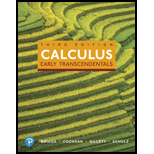
Applying convergence tests Determine whether the following series converge. Justify your answers.
45.
Trending nowThis is a popular solution!

Chapter 10 Solutions
Calculus: Early Transcendentals (3rd Edition)
Additional Math Textbook Solutions
University Calculus: Early Transcendentals (3rd Edition)
Calculus: Early Transcendentals (2nd Edition)
Calculus, Single Variable: Early Transcendentals (3rd Edition)
- Choose correct answer. show your solution.arrow_forward-1+e 2+e 3+ . if it converges. Determine the sum of the series e O diverges. e e-1 A Moving to the next question prevents changes to this answer. re to search *: F2 F3 F4 PrtScn F5 F6 F7 F8 & 3. 4. 6. 8. W Y U 23 %24arrow_forwardHelp with the following questionarrow_forward
- Use any method to determine if the series converges or diverges. Give reasons for your answer. (n+5)(n+2) n! n=1 Select the correct choice below and fill in the answer box to complete your choice. O A. The series converges because the limit used in the nth-Term Test is B. The series diverges because the limit used in the Ratio Test is Oc. The series converges because the limit used in the Ratio Test is OD. The series diverges because the limit used in the nth-Term Test isarrow_forwardplease give neat answerarrow_forwardCorrect answer please 5arrow_forward
 Calculus: Early TranscendentalsCalculusISBN:9781285741550Author:James StewartPublisher:Cengage Learning
Calculus: Early TranscendentalsCalculusISBN:9781285741550Author:James StewartPublisher:Cengage Learning Thomas' Calculus (14th Edition)CalculusISBN:9780134438986Author:Joel R. Hass, Christopher E. Heil, Maurice D. WeirPublisher:PEARSON
Thomas' Calculus (14th Edition)CalculusISBN:9780134438986Author:Joel R. Hass, Christopher E. Heil, Maurice D. WeirPublisher:PEARSON Calculus: Early Transcendentals (3rd Edition)CalculusISBN:9780134763644Author:William L. Briggs, Lyle Cochran, Bernard Gillett, Eric SchulzPublisher:PEARSON
Calculus: Early Transcendentals (3rd Edition)CalculusISBN:9780134763644Author:William L. Briggs, Lyle Cochran, Bernard Gillett, Eric SchulzPublisher:PEARSON Calculus: Early TranscendentalsCalculusISBN:9781319050740Author:Jon Rogawski, Colin Adams, Robert FranzosaPublisher:W. H. Freeman
Calculus: Early TranscendentalsCalculusISBN:9781319050740Author:Jon Rogawski, Colin Adams, Robert FranzosaPublisher:W. H. Freeman
 Calculus: Early Transcendental FunctionsCalculusISBN:9781337552516Author:Ron Larson, Bruce H. EdwardsPublisher:Cengage Learning
Calculus: Early Transcendental FunctionsCalculusISBN:9781337552516Author:Ron Larson, Bruce H. EdwardsPublisher:Cengage Learning





